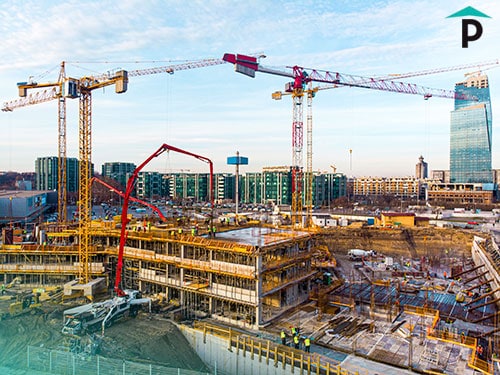Pinnacle offers a range of surety bonds designed to protect contractors and owners during construction projects. Because we focus exclusively on construction bonds, we can provide the most services and best rates. We work to aggressively improve surety bond parameters to ensure that you get the cover you need precisely when you need it.
Call: (844) 612-7238 to get started
The types of bonds we offer include:
Excavation Surety Bonds
Excavation surety bonds, also called lateral support bonds and lateral support permit bonds, are financial instruments that let your company protect itself against damage that it causes to adjacent properties during work. Typically, companies doing sewerage or sanitary work will buy bonds for lateral support situations where adjacent roads or buildings are at risk.
At Pinnacle Surety, we help you determine precisely how much coverage you should get. The amount you need often depends on the municipality in which you carry out the work. Sometimes, you may have to get bonds that include both contingency and cost increase factors. You will also need to demonstrate that you observed due diligence in protecting surrounding land and property from damage during the works.
Subdivision bonds
Subdivision bonds, also called performance bonds or plat bonds, are financial instruments that state customers (such as cities, public agencies and the federal government) use to ensure that contractors carry out work to the standards they expect. Contractors temporarily take ownership of the site (such as sidewalks, storm drains, curbs or gutters) and then hand it back to the state client once they complete the work.
Subdivision bonds can be challenging to arrange and implement, which is why Pinnacle Surety offers assistance to all contractors who need to take them out. To be able to develop a parcel of land and proceed with a project, you must obtain a subdivision or plat bond. This details the improvements the state authority requires you to make.
Construction bonds
 If you are building a new development, you will need to apply for a construction bond, also called a completion bond. These bonds protect the person buying your services from financial losses incurred during the construction phase. They protect them if you fail to complete a project on time or not at all.
If you are building a new development, you will need to apply for a construction bond, also called a completion bond. These bonds protect the person buying your services from financial losses incurred during the construction phase. They protect them if you fail to complete a project on time or not at all.
Construction bonds from Pinnacle Surety actually help to protect contractors as well. They provide the cash that owners need to cover their losses if you run into trouble during the construction process. They address cash flow problems that could put the entire project in jeopardy or cover situations where you aren’t able to complete the project to the desired specifications.
Contract bonds
A contract bond acts as a guarantee that all parties will fulfill the terms of the contract during a construction project. If contractors fail to adhere to the terms of the agreement, the owner of the contract can recover financial losses via the bond. Therefore, bonds guarantee payment.
In many cases, investors require contract bonds. These protect them if a contractor fails to complete work or doesn’t do the job properly.
Contractors are required to have a contract bond for virtually every type of government work. The bond provides assurance to the project owner that the contractor will perform to the standards set out in the agreement.
Most contract bonds involve three parties. The first is the investor or owner, also called the obligee (because they are the party who will receive money via the bond). The second is the parties involved in the project, and the final group is the surety company that underwrites the bond.
The obligee – usually the government – pays a premium to the surety company. They then look for the contractor offering the lowest bid to complete their construction project. The bond protects the government from dealing with a contractor that might be offering a price that is too low to cover the work. The bond then ensures that the contractor completes the project to the desired standard or provides money so that the obligee has the necessary funds to approach another company.
Bid bonds
Bid bonds guarantee that a contractor will take on work if they complete a successful bid. Thus, they protect the owner of the project against losses resulting from administering a bid process that doesn’t result in active work on the ground,
Because Pinnacle Surety specializes in providing bid bonds, it is able to offer contractors more favorable bond parameters and lower premiums. Our bid bonds, therefore, are highly competitive.
Bid bonds are required for most public sector work because of the 1932 Miller Act. States also have their own versions of the Miller Act which stipulate bid bond requirements during the work award process. Penalties tend to be around 10 percent of the entire project value. You may have to pay more than this if you work on Federal construction projects – as high as 20 percent.
Performance bonds
Performance bonds – also called subcontractor payment bonds and performance bonds are a legal agreement established between a surety and a subcontractor. These protect the contractors if a subcontractor cannot complete work for any reason.
Pinnacle Surety performance bonds offer all kinds of benefits. We first check the history of the subcontractor to make sure that they have a track record of high performance in the past. We also investigate their cash flow to ensure that they can complete projects according to the specification. Once the performance bond is in place, subcontractors indemnify the surety for any losses incurred via the bond.
Grading permit surety bonds
Before contractors can begin any construction project, they must first grade the land to determine whether it is suitable for the building they wish to construct on top of it. They should check that it is able to support the weight of the structure and other things that the property requires, such as driveways.
Legally, companies cannot begin grading land until they have a grading permit surety bond. This financial tool is mainly used on federal and state construction projects. It agrees to pay out financial compensation if there is fraud, malfeasance, defaults on contractor payments or contractor bankruptcy. The goal is to protect innocent parties from losses that weren’t their fault.


